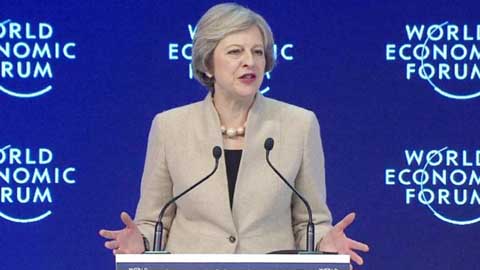
Reuters, Davos :
Britain is facing a period of momentous change following its decision to leave the European Union and will need to forge a new role in the world, Prime Minister Theresa May told the World Economic Forum in Davos on Thursday.
May, who has said Britain wants a “bold and ambitious” trade agreement with the EU when it leaves the bloc, said Britain would step up to a new leadership role as a strong advocate for business, free markets and free trade after Brexit.
“Let us not underestimate the magnitude of that decision. Britain must face up to a period of momentous change, it means we must go through a tough negotiation and forge a new role for ourselves in the world, it means accepting that the road ahead will be uncertain at times,” May said.
May also said Britain had already started discussions on future trade ties with countries including New Zealand, Australia and India. Theresa May has told leaders at the World Economic Forum in Davos that the UK will be a “world leader” on trade.
But the prime minister also warned that inequality blamed on globalisation was aiding the “politics of division”.
Her speech to business leaders and politicians in Switzerland comes after EU leaders said a post-Brexit trade deal with the UK would be “difficult”.
The European Commissioner for Economic Affairs, Pierre Moscovici, said Brexit would be bad for the UK and the EU.
In her speech, Mrs May said the world was enjoying an “unprecedented level of wealth”, but many people felt this was “not working for them”.
Global elites needed to tackle the backlash against globalisation, liberalism, and free trade because leaders who “embrace the politics of division and despair” were working to exploit the situation.
Mrs May said: “Talk of greater globalisation can make people fearful. For many it means their jobs outsourced and their wages undercut. It means having to sit back as they watch their communities change around them.
“And in their minds, it means watching as those who prosper seem to play by a different set of rules, while for many life remains a struggle as they get by, but don’t necessarily get on.”
BBC assistant political editor Norman Smith writes: I didn’t expect Theresa May’s speech to give so much emphasis to the downside of globalisation and, with it, implicit criticism of the international elite.
She suggested that too many bosses were not playing by the rules of paying their taxes, taking on board their social responsibility or spreading the benefits of growth and wealth.
That’s quite a tough message when you’re talking about people in front of you.
Mrs May needs these people to be on board because they bring in billions of pounds of investment – she also needs them to be confident about Brexit.
Her message to the international elite was fairly blunt: “You guys need to shape up the way you operate – we can’t carry on as before.”
What about plans for the UK economy post-Brexit?
The prime minister promised that the UK after Brexit would take on a “leadership role as the strongest and most forceful advocate for free markets and free trade anywhere in the world”.
She argued for reforms so the global economy created wealth for all, rather than a “privileged few”, and “centre-ground mainstream politics” could “work for everyone”.
In the UK, Mrs May said, she would announce her “industrial strategy” soon, adding that this would “address the longstanding and structural weaknesses our economy”.
She said: “This is not about propping up failing industries or picking winners but creating the conditions where winners can emerge and grow.”

